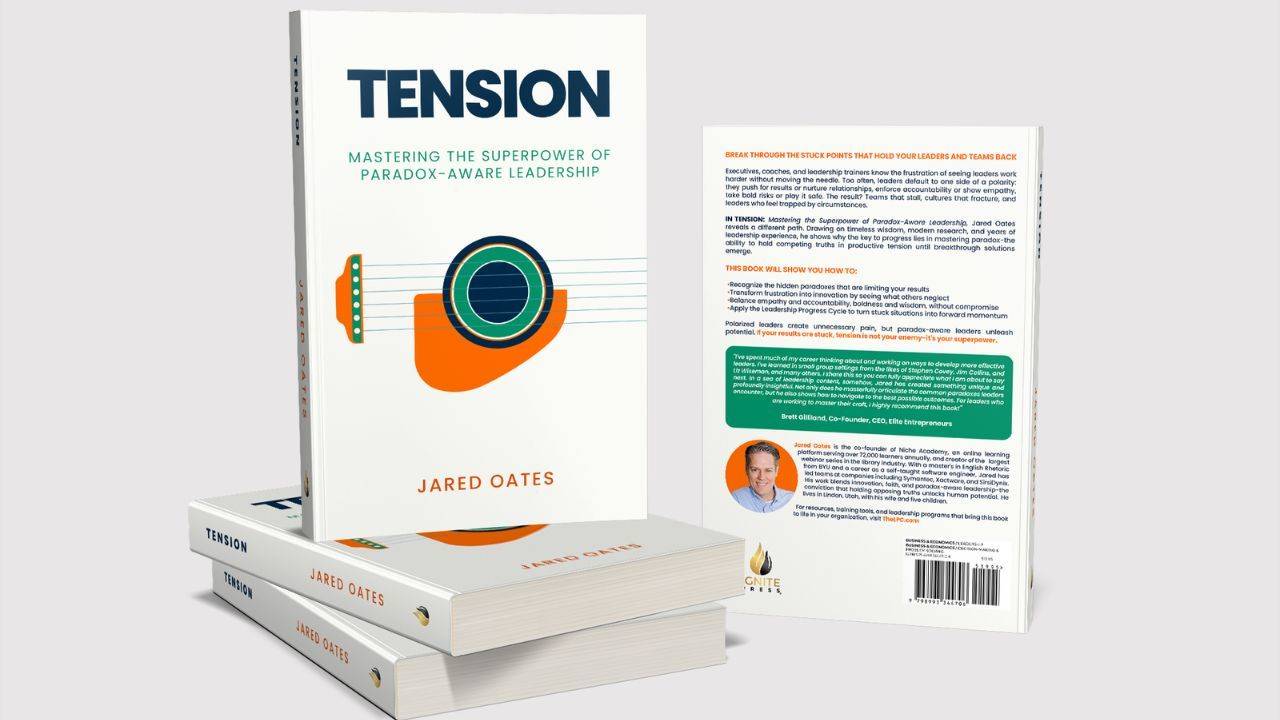Paradox-Awareness Is a Superpower
Nov 18, 2025
Today marks the launch of my new book: Tension—Mastering the Superpower of Paradox-Aware Leadership. Every leader I know has strengths. Strategic thinking. Clear communication. Decent parallel parking. But there’s another capability few know about—one so rare and so impactful that behaves suspiciously like a superpower.
Paradox-Awareness.
It lets you see solutions that are invisible to other leaders. And in a polarized, performative, everyone-yelling-at-once environment, it feels almost supernatural. But I'm on a mission to make it less rare.
Why Paradox-Awareness Feels So Rare
A superpower is, by definition, unusual. If everyone had access to Super-Soldier Serum, Marvel movies would be much less interesting, but we'd also pay less for health care (more on that in a minute). Paradox-awareness is only rare because most people have never been taught that opposing necessaries are actually interdependent.
Even fewer have seen what a Both/And solution to a difficult problem looks like in practice. Many confuse it with a mushy compromise—the lukewarm soup of decision-making. But Both/And thinking isn’t about splitting the difference or getting just half of what's needed. It’s about finding solutions that fully meet two seemingly opposing needs.
Without such solutions, we get stalemates. Standoffs. Shutdowns.
A Case Study in Polarization: The Recent U.S. Government Shutdown
Let’s consider together the shutdown that just ended in the U.S. government as a case in point. If we assume the stated arguments on both sides are sincere, the core issues are access to healthcare and the cost of it.
- Democrats argue that ending ACA marketplace tax credits will push health coverage out of reach for millions of Americans.
- Republicans argue that the ACA tax credits are too expensive and inappropriate for federal responsibility.
Both sides insist they are fighting for something necessary: coverage on one side, sustainable costs on the other. Yet the conversation remains trapped in the familiar pattern:
We’re right, you’re wrong, and somewhere a news alert will confirm it.
That’s polarized thinking. It rewards the loudest certainty, not the deepest insight. Leaders in this mode don’t dare acknowledge what the other side is fighting for. It feels too risky, too disloyal, too much like treason to the tribe.
Polarized leaders argue for obvious answers:
- People suffer without care, obviously we just need to expand access.
- Current costs are unsustainable, obviously we just need to spend less.
Paradox-aware leaders understand a deeper reality.
Where Paradox Changes Everything
Here’s the deeper reality that rarely makes the news crawl: access and affordability are interdependent. You simply cannot sustainably increase access to care without lowering costs, and you cannot meaningfully lower the long-term cost burden without increasing access.
The millions who lack preventive or primary care still get sick. They show up later and sicker. Their conditions cost more—financially, physically, socially. Those costs wash through emergency rooms, hospitals, insurance pools, and household bankruptcies.
And the cycle continues.
The liberating insight is hiding in a paradox:
Better access reduces catastrophic cost. Lower cost enables broader access.
Each is the key to the other.
Paradox-aware leaders don’t settle for the obvious answers because they know transformative innovations live in the tension between competing necessities. They are willing to explore promising ideas like direct primary care models, in-home alternatives to hospitalization, 24/7 Insta-care facilities, and other experiments that reduce cost while expanding care.
These are not half-and-half compromises. They’re integrated, inventive, Both/And strategies. Everyone wins. That’s the mark of genuine innovation.
Why This Matters for Leaders and Teams
Every leader faces their own paradoxes:
Providing autonomy while ensuring alignment.
Moving fast while reducing risk.
Serving customers while developing employees.
Honoring tradition while driving change.
Most treat these tensions as enemies to be managed or avoided. But paradox-aware leaders recognize them as engines of creativity. When you learn to stop choosing between necessary things and start integrating them, your leadership becomes more creative, more innovative, and your solutions longer lasting.
It also becomes more hopeful—because you realize the future isn’t trapped in binary choices. It is shaped, instead, by leaders who can tap into the ancient wisdom of paradox and allow something new to emerge.
A Superpower You Can Learn
This is the work of my new book which is celebrating its official launch today, Tension—Mastering the Superpower of Paradox-Aware Leadership.
It offers a simple, repeatable process for understanding paradoxes, working with their tension, and applying Both/And thinking to real leadership challenges—from teams to organizations to the decisions you make before breakfast.
And today, you can get it for almost nothing.
Today Only: Get the Kindle Edition for 99¢
To celebrate launch day, my publisher, Ignite Press, is offering the Kindle version for just 99¢.
Here’s the link to the promotional price:
https://geni.us/TENSION
If you prefer a printed copy, that’s available too—but picking up the Kindle version today helps boost visibility for the book and gets this message of paradox-aware leadership into more hands.
If you’ve ever sensed that leadership demands more than choosing sides—or if you’re ready to explore the creative, catalytic power of tension—today is the perfect day to start.
What if your greatest strength is also holding you back?
Take the free Leadership Strengths Self-Assessment and start a conversation with your team about how polarized leadership strengths can limit your results.
Get new insights for finding breakthrough solutions.
My free newsletter gives you weekly ways to see what other leaders miss. Sign up below. Opt out any time.
We hate SPAM. We will never sell your information, for any reason.
